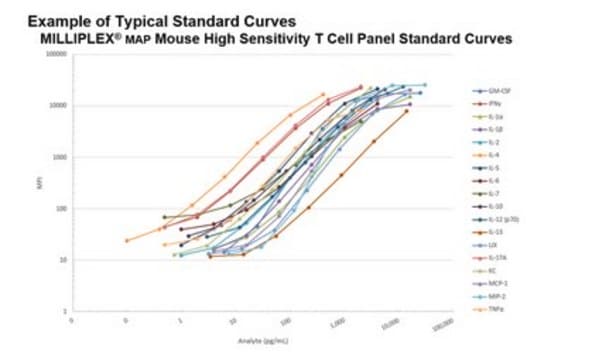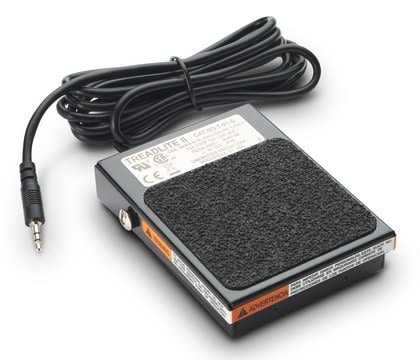MHSTCMAG-70K
MILLIPLEX® Mouse High Sensitivity T Cell Panel - Immunology Multiplex Assay
Simultaneous analyze low levels of cytokine and chemokine biomarker with the High Sensitivity Bead-Based Multiplex Assays using the Luminex technology, in mouse serum, plasma and cell culture samples.
Synonym(s):
Luminex® Mouse Immunology Panel, Millipore Mouse Immunology Panel, Mouse Immunology Protein Multiplex Assay
About This Item
Recommended Products
Quality Level
species reactivity
mouse
manufacturer/tradename
Milliplex®
assay range
accuracy: 82-102%
sensitivity: 0.26-11.14 pg/mL
standard curve range: 0.10-400 pg/mL
(IL-4)
standard curve range: 0.49-2,000 pg/mL
(IFNγ)
standard curve range: 0.49-2,000 pg/mL
(IL-17A)
standard curve range: 0.49-2,000 pg/mL
(IL-7)
standard curve range: 0.49-2,000 pg/mL
(TNFα)
standard curve range: 0.73-3,000 pg/mL
(KC/GROα/CXCL1)
standard curve range: 0.98-4,000 pg/mL
(IL-2)
standard curve range: 0.98-4,000 pg/mL
(IL-5)
standard curve range: 0.98-4,000 pg/mL
(IL-6)
standard curve range: 1.34-5,500 pg/mL
(IL-10)
standard curve range: 2.93-12,000 pg/mL
(IL-12 (p70))
standard curve range: 3.17-13,000 pg/mL
(LIX)
standard curve range: 3.42-14.000 pg/mL
(IL-13)
standard curve range: 3.91-16,000 pg/mL
(IL-1α)
standard curve range: 3.91-16,000 pg/mL
(IL-1β)
standard curve range: 3.91-16,000 pg/mL
(MCP-1/CCL2)
standard curve range: 6.1-25,000 pg/mL
(GM-CSF)
standard curve range: 7.32-30,000 pg/mL
(MIP-2/CXCL2)
inter-assay cv: <15%
intra-assay cv: <10%
technique(s)
multiplexing: suitable
detection method
fluorometric (Luminex xMAP)
shipped in
ambient
General description
Low levels of inflammation are involved in many clinical and sub-clinical disease states, such as autoimmune disease, cardiovascular disease, diabetes, neurological disorders, and cancer. Measuring picogram levels of cytokines, therefore, is critical for understanding the pathogenesis of these diseases.
Panel Type: Cytokines/Chemokines
Specificity
There is no detectable cross-reactivity within the panel.
Application
- Analytes: GM-CSF, IFNγ, IL-1α, IL-1β, IL-2, IL-4, IL-5, IL-6, IL-7, IL-10, IL-12 (p70), IL-13, IL-17A, KC/CXCL1, LIX, MCP-1, MIP-2, TNF-α
- Recommended Sample type: serum, plasma, tissue culture or other media
- Recommended Sample dilution: neat or 1:2 diluted serum or plasma
- Assay Run Time: Overnight
- Research Category: Inflammation & Immunology
- Research Subcategory: Immune Response Metabolic Disorders Chronic Inflammatory Disease Cardiovascular Disease
Features and Benefits
Storage and Stability
Other Notes
Legal Information
Disclaimer
Signal Word
Danger
Hazard Statements
Precautionary Statements
Hazard Classifications
Acute Tox. 4 Dermal - Acute Tox. 4 Inhalation - Acute Tox. 4 Oral - Aquatic Chronic 2 - Eye Dam. 1 - Skin Sens. 1 - STOT RE 2
Target Organs
Respiratory Tract
Storage Class Code
10 - Combustible liquids
Certificates of Analysis (COA)
Search for Certificates of Analysis (COA) by entering the products Lot/Batch Number. Lot and Batch Numbers can be found on a product’s label following the words ‘Lot’ or ‘Batch’.
Already Own This Product?
Find documentation for the products that you have recently purchased in the Document Library.
Our team of scientists has experience in all areas of research including Life Science, Material Science, Chemical Synthesis, Chromatography, Analytical and many others.
Contact Technical Service










